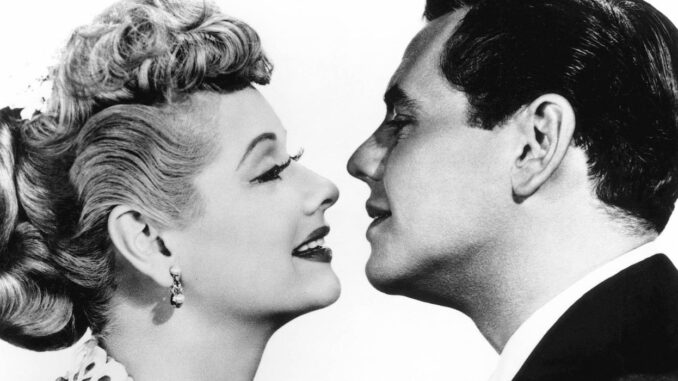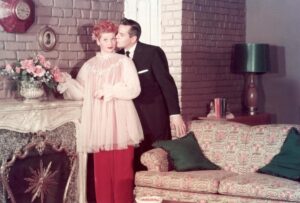
Introduction: A Glimpse Into a Dream World
When I Love Lucy hit television screens in 1951, it wasn’t just a groundbreaking sitcom; it was a cultural phenomenon. At its heart were Lucy Ricardo, played by Lucille Ball, and her Cuban bandleader husband, Ricky Ricardo, portrayed by Desi Arnaz. This iconic duo didn’t just entertain; they introduced millions of Americans to a romanticized version of Cuba. But how did I Love Lucy craft this vision of Cuba, and why does it still resonate with audiences today? Let’s dive into the colorful, melodic, and dreamlike Cuba of America’s imagination.
How Desi Arnaz Shaped America’s Image of Cuba
The Cuban Bandleader Who Won America’s Heart
Desi Arnaz wasn’t just an actor—he was a living embodiment of Cuban charisma. Born in Santiago de Cuba, Arnaz brought authenticity to the role of Ricky Ricardo. With his suave demeanor, rich accent, and undeniable musical talent, he introduced American audiences to a vibrant slice of Cuban culture.
Music as the Bridge Between Cultures
Ricky Ricardo’s performances at the Tropicana nightclub weren’t just comedic moments; they were cultural showcases. His renditions of Cuban classics like Babalu blended Latin rhythms with American jazz influences, creating an irresistible fusion that left audiences mesmerized.
The Idealized Cuba of Post-War America
Escapism Through Television
In the 1950s, Americans were drawn to stories that offered a break from the realities of post-war life. Cuba, as presented in I Love Lucy, was a tropical paradise—a place of vibrant music, delicious food, and carefree living.
The Allure of the Tropics
Cuba represented an exotic yet accessible dream for many Americans. With its beaches, palm trees, and lively culture, it became a stand-in for escapism. Even if viewers couldn’t visit, they could experience its charm through their TV screens.
The Cultural Impact of Ricky Ricardo
Breaking Stereotypes While Reinforcing Others
While Ricky Ricardo was a beloved character, his portrayal wasn’t free from stereotypes. His fiery temper and accented English became comedic staples. However, Desi Arnaz also challenged racial barriers by portraying a Cuban man as a loving husband, a successful businessman, and a comedic equal to Lucy.
A Love Story That Defied the Norms
Lucy and Ricky’s interracial marriage was groundbreaking for its time. Their relationship helped normalize cross-cultural unions, presenting them as relatable, humorous, and deeply human.
How ‘I Love Lucy’ Highlighted Cuban Traditions
Cuban Food: A Tantalizing Glimpse
The show often featured Lucy attempting to cook Cuban dishes, much to Ricky’s amusement. This comedic interplay introduced viewers to staples like arroz con pollo, showcasing the flavors of Cuban cuisine.
Celebrations and Customs
Episodes featuring Cuban traditions, such as Ricky’s birthday party or his family visiting, provided glimpses into the lively and familial Cuban culture. These moments, though dramatized, felt authentic and welcoming.
The Role of Comedy in Cultural Exchange
Laughing Away Cultural Differences
Humor was the great equalizer in I Love Lucy. Whether it was Lucy trying to sing in Spanish or Ricky misunderstanding American idioms, these moments showcased the beauty of cross-cultural misunderstandings.
Finding Common Ground
While their cultural differences were often exaggerated for laughs, Lucy and Ricky’s relationship showed that love and laughter could transcend any barrier.

The Lasting Legacy of ‘I Love Lucy’ and Cuba
Inspiring a Generation of Travelers
The show’s depiction of Cuba as a tropical paradise left a lasting impression on Americans. For decades, Cuba remained a dream destination, fueled by the vibrant imagery and music showcased in I Love Lucy.
Pop Culture’s Continued Fascination With Cuba
From salsa music to mojitos, the influence of Cuban culture continues to permeate American life. Much of this mainstream acceptance can be traced back to the early seeds planted by I Love Lucy.
Why ‘I Love Lucy’ Still Matters Today
A Timeless Love Story
Lucy and Ricky’s relationship remains iconic, not just for its humor but for its heart. Their on-screen chemistry continues to resonate with audiences around the world.
A Cultural Bridge
Desi Arnaz’s portrayal of Ricky Ricardo helped open doors for future Latino actors, proving that talent and charm transcend borders.
A Closer Look at the Music of Ricky Ricardo
The Power of Babalu
Ricky’s signature performance of Babalu wasn’t just entertainment—it was a cultural moment. The Afro-Cuban rhythms captivated audiences, introducing them to a genre they might never have explored otherwise.
Beyond the Tropicana
Ricky’s performances extended beyond the fictional nightclub, leaving a lasting mark on the perception of Latin music in America.
How ‘I Love Lucy’ Influenced Hollywood’s View of Cuba
The Glamorous Image of Cuba in Film
Following the success of I Love Lucy, Hollywood began to romanticize Cuba in films and TV shows, often presenting it as a land of endless fiestas and romance.
Setting the Stage for Future Representation
While the show didn’t depict the political complexities of Cuba, it laid the groundwork for greater representation of Cuban culture in media.
Conclusion: The Dream That Lives On
‘I Love Lucy’ wasn’t just a sitcom; it was a cultural bridge that brought a piece of Cuba into American homes. Through its music, humor, and characters, the show painted a picture of Cuba that, while idealized, was undeniably enchanting. Even decades later, its influence continues to shape how we see both comedy and culture.
FAQs
1. What made Desi Arnaz’s portrayal of Ricky Ricardo unique?
Desi Arnaz brought authenticity and charm to the role, blending Cuban culture with universal humor.
2. Why was ‘I Love Lucy’ so influential in American pop culture?
It broke barriers, introduced cultural diversity, and featured a timeless mix of humor and heart.
3. Did the show accurately depict Cuban culture?
While it romanticized Cuba, the show offered authentic glimpses into music, food, and traditions.
4. How did ‘I Love Lucy’ impact Latino representation in Hollywood?
It paved the way for future Latino actors by showcasing a positive, multidimensional character.
5. Why is ‘I Love Lucy’ still beloved today?
Its humor, relatable characters, and cultural impact make it a timeless classic.